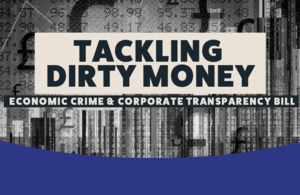New crackdown on fraud and money laundering to protect UK economy
Wide ranging reforms designed to bear down on kleptocrats, organised criminals and terrorists abusing the UK’s open economy have been introduced into Parliament.

The Economic Crime and Corporate Transparency Bill will strengthen the UK’s reputation as a place where legitimate businesses can thrive while driving dirty money out of the UK. Through the reforms, anyone who registers a company in the UK will need to verify their identity, tackling the use of companies as a front for crime or foreign kleptocrats.
The reforms to Companies House – its biggest upgrade in 170 years – will also see the organisation armed with new powers to check, challenge and decline incorrect or fraudulent information, making it a more active gatekeeper over company creation. The investigation and enforcement powers of Companies House will also be upgraded, enabling the organisation to cross check data with public and private partners, as well as reporting suspicious activity to security agencies and law enforcement.
The Bill will also help prevent the abuse of limited partnerships – including those registered in Scotland, for money laundering and other nefarious purposes – by tightening registration and transparency requirements for these entities.
Law-abiding businesses and investors across the UK will benefit from simplified filing requirements and a more reliable companies register to inform business and lending decisions. The reforms will ensure that small business owners, consumers and the public are better protected from fraudulent use of their identities and addresses.
Business Secretary Jacob Rees-Mogg said:
We want the UK to be the best place in the world to invest and start a business, but we must not allow this openness to be exploited by fraudsters misusing the identities of innocent people, or corrupt elites attempting to disguise their dodgy dealings.
This historic Bill will equip Companies House and law enforcement with the tools they need to root out criminals attempting to hide their activities without burdening law-abiding companies with unnecessary bureaucracy. Above all, via strict enforcement measures, we are telling investors that the UK is open for legitimate business only.
Home Secretary Suella Braverman said:
The UK is no home for dirty money. The government has taken unprecedented action to prevent kleptocrats and organised criminals from abusing our open economy, and this Bill will go even further.
Through this Bill we are giving our law enforcement agencies greater powers and intelligence capabilities to stay one step ahead of the criminals intent on keeping their corrupt assets out of reach.
Security Minister Tom Tugendhat said:
As the former chair of the Foreign Affairs Committee, I commended the government on the swift legislative action it took on dirty money following the invasion of Ukraine, but I implored them to go even further.
I am delighted that today we are introducing reforms that will make it much harder for kleptocrats to shield their ill-gotten gains and treat the UK as their safe deposit box. As Security Minister, I am committed to delivering this vital piece of legislation to strengthen our fight against economic crime.
Law enforcement will also benefit from greater powers to compel businesses to hand over information which could be related to money laundering or terrorist financing. Red tape around confidentiality liability will be eased to enable businesses to share information to more proactively prevent and detect economic crime including fraud and sanctions evasion.
The new law will make it easier and quicker for law enforcement agencies such as the National Crime Agency to seize, freeze and recover cryptoassets – the digital currency increasingly used by organised criminals to launder profits from fraud, drugs and cybercrime.
The use of this digital currency has significantly increased in recent years, with the Metropolitan Police reporting a big rise in cryptocurrency seizures last year. Strengthening powers in the Proceeds of Crime Act will modernise the legislation to ensure agencies can keep pace with the rapid technological change and prevent assets from funding further criminality.
The package of measures will build upon the earlier Economic Crime (Transparency and Enforcement) Act, brought in following Russia’s invasion of Ukraine. The act has made it much quicker to impose tough sanctions on Putin’s cronies – freezing their UK assets and cutting off funds to the Kremlin’s war machine – as well as establishing the recently launched Register of Overseas Entities to root out corrupt oligarchs attempting to hide ill-gotten gains through UK property.
Director General of the National Crime Agency Graeme Biggar said:
Domestic and international criminals have for years laundered the proceeds of their crime and corruption by abusing UK company structures, and are increasingly using cryptocurrencies. These reforms – long awaited and much welcomed – will help us crack down on both.
Companies House Chief Executive Louise Smyth said:
We welcome the measures outlined in this Bill, which represent the most significant and far-reaching changes to the UK’s company register in over 170 years of history and will enable us to play a much stronger role in making the UK a great place to do business.
If agreed, these changes will allow us to actively improve and maintain the integrity of the register like never before; inspire greater trust in our data, crack down on economic crime and further drive confidence in the UK economy.
While the scale and scope of these changes should not be underestimated, the work already done through our wide-ranging and ongoing transformation programme puts us in a strong position to implement them as quickly and efficiently as possible.